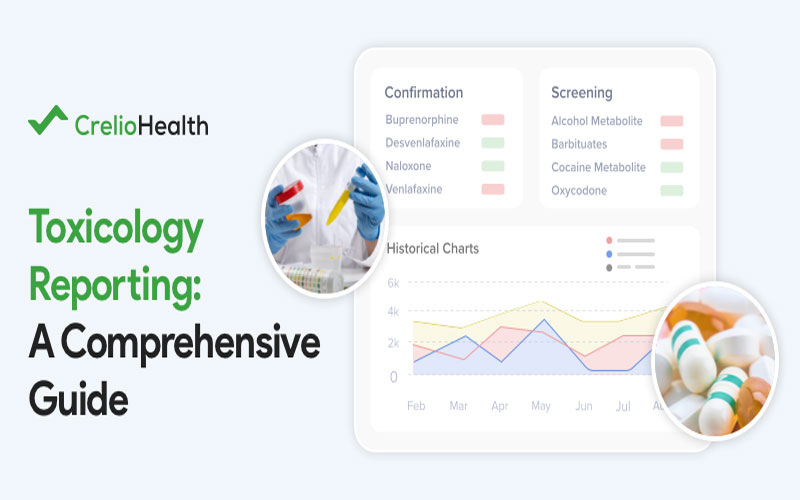In today’s rapidly evolving medical landscape, the significance of advanced toxicology diagnostics cannot be overstated. These diagnostics play a crucial role in identifying and understanding toxic substances that can adversely affect human health LTG. As urbanization and industrialization continue to rise, exposure to various environmental toxins has become a pressing concern, making it imperative to develop sophisticated means of detection and assessment.
Advanced toxicology diagnostics encompass a range of methods and technologies designed to identify and quantify toxic agents in biological samples. From blood tests to advanced imaging techniques, these diagnostics offer insights into the presence of harmful substances in the body, thereby allowing healthcare professionals to take appropriate measures for treatment or prevention. This article delves into the multifaceted world of advanced toxicology diagnostics, exploring its importance, methodologies, applications, and future prospects.
Understanding the Landscape of Toxicology

The field of toxicology is vast and complex, encompassing various disciplines aimed at understanding the effects of chemical substances on living organisms. In this section, we will explore the fundamental aspects of toxicology and how advanced toxicology diagnostics fit into the larger picture.
The History and Evolution of Toxicology
Toxicology has evolved significantly over the centuries, transitioning from early rudimentary practices to a sophisticated science grounded in biochemistry and pharmacology.
The origins of toxicology can be traced back to ancient civilizations where herbalists and physicians experimented with plants’ medicinal properties and potential poisons. With time, as the understanding of chemistry and biology progressed, toxicology emerged as a distinct scientific discipline.
Today, toxicologists utilize advanced technologies such as genomics, proteomics, and metabolomics to analyze how chemicals interact with biological systems. Advanced toxicology diagnostics represent the pinnacle of this evolution, providing precise tools for identifying toxic exposures and their impacts on health.
Key Components of Toxicological Assessments
A comprehensive toxicological assessment involves several critical components, each playing a vital role in understanding the potential risks associated with toxic substances.
Firstly, exposure assessment determines the extent and duration of an individual’s contact with a toxic agent. This can involve analyzing environmental samples, occupational exposures, or even dietary intake.
Secondly, dose-response evaluation examines the relationship between the amount of toxic substance absorbed and the resulting health effects. Advanced toxicology diagnostics help elucidate these relationships by providing quantitative data on biomarker levels and physiological responses.
Lastly, risk characterization integrates the information obtained from exposure and dose-response assessments to provide a clear picture of potential health risks. By employing advanced diagnostic methodologies, toxicologists can create more accurate risk profiles tailored to individual populations or specific environments.
Modern Challenges in Toxicology
Despite the advancements in toxicology, researchers face various challenges that complicate the assessment of toxic exposures.
One significant challenge is the increasing number of emerging contaminants, including pharmaceuticals, personal care products, and microplastics. These substances often go unmonitored and under-regulated, creating a pressing need for advanced detection and quantification methods.
Another challenge is the individual variability in toxic responses. Genetic, metabolic, and lifestyle factors can significantly influence how different people respond to the same toxic substance. Advanced toxicology diagnostics aim to address this issue by integrating personalized medicine approaches, thus enhancing the precision of risk assessments.
Methodologies in Advanced Toxicology Diagnostics
The methodologies employed in advanced toxicology diagnostics are diverse and continually evolving. This section will delve into some of the most prevalent techniques, highlighting their effectiveness and applicability in various scenarios.
Mass Spectrometry: Unveiling Complex Mixtures
Mass spectrometry has revolutionized the field of toxicology by allowing scientists to analyze complex mixtures of compounds with unmatched precision.
This technique works by ionizing chemical substances and measuring their mass-to-charge ratios. It provides detailed information about the molecular structure and composition of unknown compounds, making it invaluable for identifying drugs, environmental pollutants, and metabolites in biological samples.
Mass spectrometry also enables forensic toxicologists to analyze post-mortem samples, offering critical insights into potential causes of death or exposure levels. Its ability to detect substances at incredibly low concentrations makes it a cornerstone in advanced toxicology diagnostics.
High-Throughput Screening: Speeding Up Toxicological Assessments
High-throughput screening (HTS) is another innovative methodology gaining traction in toxicology diagnostics. HTS allows researchers to evaluate thousands of compounds simultaneously, significantly accelerating the process of toxicity testing.
By utilizing automated technologies combined with advanced biochemical assays, HTS provides a wealth of data regarding the potential toxic effects of new chemicals prior to their introduction into markets. This approach not only improves safety assessments but also aids in prioritizing compounds for further investigation, ultimately streamlining the regulatory approval process.
Genomic and Proteomic Technologies: The Future of Precision Diagnostics
With the advent of genomics and proteomics, advanced toxicology diagnostics have entered a new realm of precision medicine. These technologies allow researchers to study the expression of genes and proteins in response to toxic exposures, providing deeper insights into individual susceptibility to toxins.
For instance, genomics can reveal genetic polymorphisms that influence how individuals metabolize certain chemicals. Similarly, proteomics can uncover biomarkers that indicate exposure to toxicants or the body’s physiological response to these substances.
Together, these approaches pave the way for personalized toxicology, tailoring interventions based on an individual’s unique genetic makeup and exposure history. As research progresses, we can expect increasingly sophisticated diagnostic tools that enhance our understanding of toxicology at the molecular level.
Applications of Advanced Toxicology Diagnostics
The applications of advanced toxicology diagnostics extend across numerous fields, from clinical medicine to environmental monitoring. This section explores some of these key areas, emphasizing the impact these diagnostics have on public health and safety.
Clinical Toxicology: Enhancing Patient Care
In clinical settings, advanced toxicology diagnostics play a crucial role in patient care, particularly in cases of suspected poisoning or overdose.
When patients present with symptoms indicative of toxic exposure, timely diagnostics are essential for guiding treatment decisions. Advanced methods such as liquid chromatography-tandem mass spectrometry (LC-MS/MS) enable rapid identification of drugs or toxins within biological specimens, facilitating prompt medical intervention.
Moreover, continuous advancements in point-of-care testing are improving access to toxicology diagnostics in emergency departments, allowing healthcare providers to make informed decisions without delay. Ultimately, the integration of advanced toxicology diagnostics enhances patient outcomes and mitigates risks associated with toxic exposures.
Environmental Monitoring: Safeguarding Public Health
Advanced toxicology diagnostics are instrumental in environmental monitoring efforts aimed at protecting public health.
As pollution levels soar due to industrial activities and agricultural practices, the ability to monitor and assess toxic substances in air, water, and soil has become increasingly crucial. The development of sensitive detection methods allows for the identification of hazardous materials, enabling authorities to implement timely interventions.
Additionally, biomonitoring techniques can measure toxicant levels within populations, providing valuable insights into public health trends. By combining advanced diagnostics with epidemiological studies, researchers can better understand the connections between environmental exposures and adverse health outcomes, shaping effective policy decisions.
Forensic Toxicology: Justice through Science
Forensic toxicology is a critical application of advanced toxicology diagnostics in the legal system.
In criminal investigations, toxicologists analyze biological samples to determine the presence of drugs, alcohol, or other toxic substances in individuals involved in incidents such as overdose, accidents, or homicides. Advanced techniques such as gas chromatography-mass spectrometry (GC-MS) facilitate the accurate identification of substances, helping establish causative links in legal cases.
Furthermore, the ability to detect novel psychoactive substances using advanced diagnostics ensures that forensic toxicology keeps pace with the evolving landscape of drug use, contributing to justice and public safety.
FAQs
What are advanced toxicology diagnostics?
Advanced toxicology diagnostics refer to sophisticated methods and technologies used to detect and analyze toxic substances in biological samples, providing insights into potential health risks and aiding in diagnosis and treatment.
How do advanced toxicology diagnostics differ from traditional methods?
Traditional toxicology methods may involve less sensitive techniques and longer turnaround times, while advanced diagnostics employ cutting-edge technologies such as mass spectrometry and genomic analysis for faster and more precise results.
What role does mass spectrometry play in toxicology diagnostics?
Mass spectrometry is a pivotal tool in toxicology diagnostics, enabling the identification and quantification of complex mixtures of substances in biological samples, such as blood or urine.
Can advanced toxicology diagnostics help in personalized medicine?
Yes, these diagnostics can aid in personalized medicine by identifying genetic and biochemical markers that influence individual responses to toxins, allowing for tailored treatment and prevention strategies.
How do advanced toxicology diagnostics contribute to public health?
These diagnostics enhance public health by enabling effective environmental monitoring, improving clinical toxicology assessments, and supporting forensic investigations, ultimately reducing exposure risks and improving health outcomes.
Conclusion
The field of advanced toxicology diagnostics represents a dynamic intersection of science, technology, and healthcare. As our understanding of toxic substances and their effects on human health continues to evolve, the implications of these diagnostics will only grow in significance.
From identifying hazardous materials in clinical settings to monitoring environmental exposures, advanced toxicology diagnostics play a pivotal role in safeguarding public health and well-being. By embracing innovative methodologies and technologies, we can anticipate a future where toxic exposures are detected and addressed with unprecedented accuracy and efficiency.
The journey into advanced toxicology diagnostics is just beginning, and as we forge ahead, the potential benefits for individual health, communities, and society at large are boundless.
